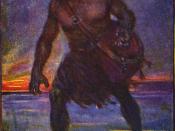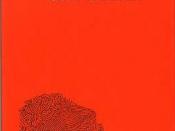John Gardner's literary masterpiece "Grendel" was created as a critique on modern philosophy. Nowhere was this more present than in Grendel's encounter with the Dragon in Chapter Five. During this particularly one sided conversation, the Dragon became an amalgam of many of modern philosophy's greatest minds. It was through this rather bleak encounter, that "Grendel" was pushed from trying to accept a mere existentialist philosophy to becoming an absolute nihilist. Existentialism is an "I" based philosophy. It is spawned from man's wish to seek out the meaning of existence and is almost wholly based on personal interpretation ("Existentialism" 1). Nihilism, on the other hand professes that human existence is without significance or legitimacy and thus has no lasting affects on a vast universe ("Nihilism" 1). The dragon rather convincingly painted the world out to be a string of inevitabilities: man will be born, man will think he has made a difference, man will die and the world will be neither for the better or worse.
This agrees with nihilist philosophy. Though Grendel only saw truth in nihilistic philosophy, he did not wish to be a nihilist. He wished to follow the existentialist teachings of the shaper; however his nature was completely opposed to this.
From the very beginning of the novel, Grendel spouted nihilist philosophy. His life up to that moment had been entirely pointless. He lived with a mother who cannot communicate on his level and he felt no love for her for this very reason. He also felt that his only purpose in life was to kill Danes, and thus he did so mechanically (In fact, later on in the novel, the Dragon said, "You are, so to speak, the brute existent by which they learn to define themselves. The...


